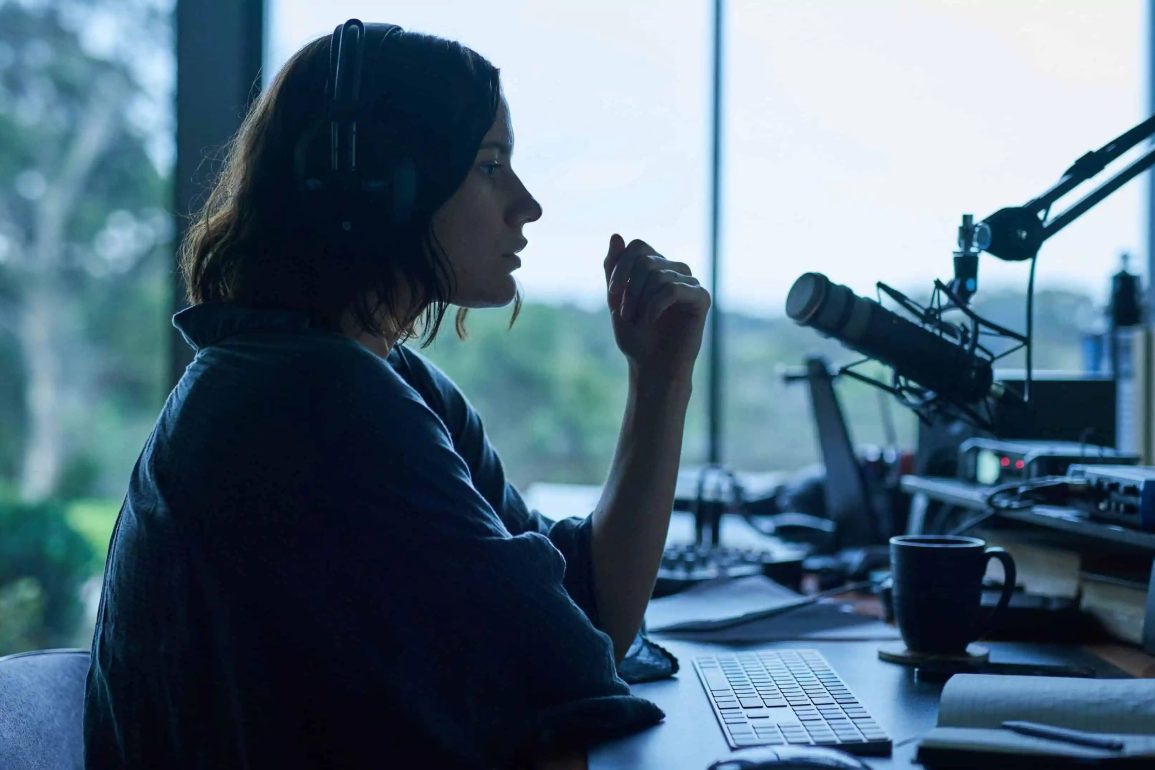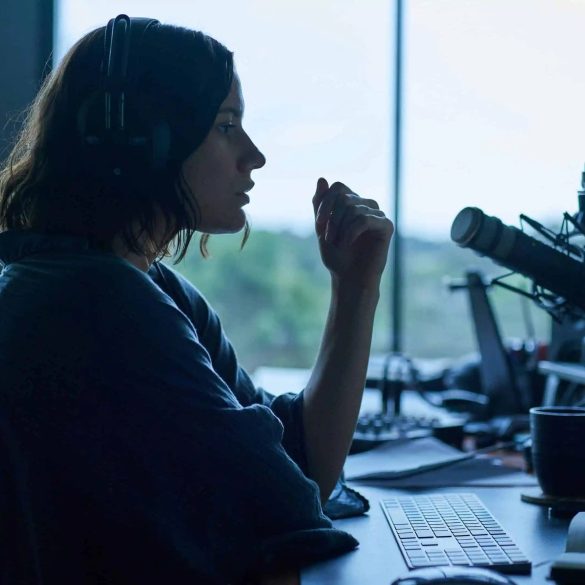Australian actor Lily Sullivan has been around for far longer than you’d expect. Seemingly an “overnight sensation,” Lily has been working for over a decade in a variety of roles and has acted with a vast range of people including Toni Collette, Liev Schreiber, Timothy Spall, Natalie Dormer, Rachel Griffiths, Samara Weaving and many more.
Lily is currently the star of Matt Vesely’s Monolith a horror adjacent science fiction thriller and made a huge splash with Lee Cronin’s Evil Dead Rise.
Nadine Whitney speaks to Lily about madness, method, and getting into weird spaces.
Read Andrew’s review of Monolith here.
Monolith is in Australian cinemas from October 26 2023.
I just did a social media shout out and asked, “Australian Scream Queens, give me your pick.” Of course, your name popped up on the very top of the list because of Monolith and Evil Dead Rise. But you’re so much more than a Scream Queen. You’ve had a career that goes far back starting with P.J. Hogan with Mental, being Miranda in the miniseries Picnic at Hanging Rock. Being the lead in I Met a Girl (opposite Australian Scream King Brenton Thwaites). What does it feel like to be now called one of Australia’s Scream Queens?
Lily Sullivan: There’s an intense gratitude I have for the diversity of roles and characters I’ve been able to play, and people I’ve collected along the way. I’m just so grateful for the timing of entering the horror genre and sci-fi thriller which is so liberating as an experience for an actor. Because you just have to entertain the craziest realities and suspense of disbelief. And also, you have to embarrass yourself so deeply!
Tell me about the embarrassment part.
LS: Ah! You go into fight or flight mode or be horrified and find anxiety but not lose your mind. There were ways I’d go into the mode as opposed to intellectualising it or trying to really feel that fear. I decided I was going to treat it more like dancing. As an actor I think my toolbox expanded. Like how to carbonate energy and creating the expression through physical means. So that meant doing really weird things on set like letting out a primal scream, or doing push ups, or doing a weird dance prior to takes. Things I haven’t done in other roles to get that energy of fear.
To get the catharsis of it all?
LS: The catharsis of it all, exactly!
Monolith is essentially you. You are carrying the entire film as the only person in the room. There are other performances via voice work and zoom screens, but you’re basically it as the protagonist. What does it feel like carrying a film via a solo performance?
LS: As soon as I read the script by Lucy Campbell and spoke to producer Bettina Hamilton, and Matt, I was terrified. So, the thing to do is to walk towards the fear. There was a lot of pressure in the way of shooting it with Matt Vesely — it was a true descent into madness. We shot in chronological order in fifteen days and it was the challenge of a lifetime.
There was part of me that was inflamed by the niggling bits of negative chat that we all have in our heads. I found it really interesting. Also, having to deal with having no physical scene partner and having no actual body to read and eyes to look into, I just found myself so deep in my own echo chamber, imagination and visuals of my own mind while acting. It was quite isolating and confronting at times. I have never appreciated other actors so much in my life.
That reflects the isolation of the character you play. She’s isolated, she only has her routine to keep her going. She’s living more and more in her own head; she’s going through a descent into madness. She’s also quite a horrible person — clawing her way back to relevance no matter what it takes, stealing other people’s stories, manipulating them no matter what the consequences.
LS: She was so difficult to marinate in for days. The deep self-loathing. There was no real release from her. Also being in that home setting and being very behavioural and inhabiting a character who is alone and quite ugly when alone. That deep obsession with being part of the clickbait economy, being addicted to living online and making noise. Trying to be seen that way. It was a bold choice because even being the only actor in the work there is a feeling of it being yuck. That it feels narcissistic. I’m sitting inside a character whose behaviour doesn’t align at all with me. It was interesting to look in the mirror, but it wasn’t me, but it was, and only me. That duality was confronting.
It’s an uncomfortable and disturbing film, that level of knowing nothing good is going to happen. There is no release, it’s just bleak — and I think that’s part of the pleasure of the film. You did a great job of keeping everyone transfixed to the screen.
The film has had festival runs all over the world including SXSW. Australian genre film is doing very well at the moment.
LS: It’s such an amazing work because it speaks to so many things: inter-generational privilege, podcasting culture, the spread of misinformation and all with that science fiction edge. I think Lucy’s script slices through those themes and flips them on their head. Using genre is so playful, it’s so exciting. It’s a great way to tell a story.
You played Miranda in Picnic with Samara Weaving, one of Australia’s other great “Scream Queens.” The question on everyone’s mind is, of course, do you think you could take her in a cage fight?
LS: (Laughing) Oh my god. Yes! But we’d have to wear corsets I reckon. God, we hated those corsets. So often as a woman, especially comparing things to works like Picnic, you don’t get to be physical. Working on genre films is so fun and freeing and it just makes you reflect that your life is not loads of “feminine” roles. Genre roles mean you get to be feral and primal.
Samara is slaying it! So yeah, we get to take off our corsets and let go.
Samara is slaying it, but so are you. You’re dealing with Deadites now. You also have Alyssa Sutherland, another Australian actor with you in Evil Dead Rise and Morgan Davies. What’s it like working on a major studio production with a bunch of other Australians?
LS: It was fantastic. Alyssa is also from Queensland, so we have a very similar sense of humour and we are playing sisters. So, we gave each other permission to just go crazy and laugh while doing these absurd things.
What are your upcoming projects? Because everyone wants to know “What’s Lily doing next?”
LS: I was about to walk on to my next international project but because of the strikes that’s stopped until a fair settlement is made. It’s a big conversation around how people consume cinema and the equity involved.
At the moment I’m actually writing which is amazing. I’m developing a half hour black comedy story, but no full details yet. I’ve been in the industry for over a decade now and I feel like I want to be part of the root system and develop it and not just come on and breathe life into a character through performance. I want to create them from the bottom up. It’s just in me. I know I can close my eyes and see the format of a screenplay or a television show. It’s really nice to flex that knowledge that I haven’t yet nurtured.
The production and direction on Monolith is very slick and accomplished.
LS: Matt did such an incredible job and Mike Tessari is a beautiful cinematographer. It’s really stripping back the art of filmmaking and working within limitations and making those limitations an asset. It’s an experimental piece. It’s a body of work that’s really a rare, rare, rare, piece. You don’t see it very often.
Oh, and oh my god, getting that black brick out of my mouth, that was wild. It was made out of this weird plastic combo; I don’t even know what it was! It was in this mouth guard in my mouth and they would CGI the tiny bit in between but I would push it to the back, and the mouth guard would stop it, but it would retract. So, like those retractable knives. I would birth it out, but I was gagging. I thought I was going to throw up on it. It was ridiculous!
There were loads of one take shots. I’d have to jump around with the body double and create a lot of body work where the muscles haven’t been formed, the tissue, so I had to think “droopy Terminator vibes,” and doing all of that was bizarre. It was such a fun challenge.
Why should people go and see Monolith?
LS: Ooooh! This is always hard for me because it’s only me on the screen and everything I say and see seems weirdly narcissistic.
You are allowed to have some bragging rights! Everyone I’ve spoken to has been stunned by your performance.
LS: Thank you. I was feeling a bit insecure, maybe insecure isn’t the right word, but worried about the judgement. Obviously, that’s something you have to let go.
I think people should go see it because South Australian Film Corporation, the New Voices Program for up-and-coming creatives and giving them the resources to build a project from the ground up is essential. It’s blood, sweat, and tears creating and making and challenging the Australian film landscape. Having films that are high concept science fiction needs to be embraced. I also feel like Monolith showcases you can do a lot with seemingly little. I hope everyone sees it.
It’s been a great year for Australian genre films. Talk To Me, Late Night With The Devil, You’ll Never Find Me just to list a few. What are a few recommendations of things you’ve seen this year?
LS: I mean, Talk To Me, boom right there! It’s just great, it’s so fucking great. Definitely Godless: The Eastfield Exorcism, Birdeater. There’s just so much great stuff out there.




